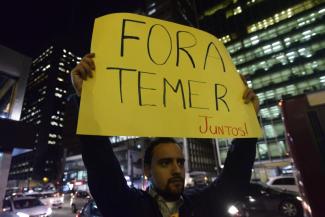Latin America
Dysfunctional governance

Brazil’s democracy is in deep crisis. According to José Álvaro Moisés of the University of São Paulo, the share of people who are in favour of dictatorship rose from 15 % to 20 % in 2016.
Supported by conservative and liberal parties, a most unpopular president is currently in power: Michel Temer. He was Dilma Rousseff’s vice president and succeeded the leader of the left-of-centre Workers‘ Party (PT) after her impeachment last summer. She was blamed for manipulating budget figures. Temer’s austerity is now undermining his predecessor’s anti-poverty programmes.
It is ironic that the new head of state is blamed for corruption himself. The evidence against him is actually more substantial than all the accusations levelled against Rousseff were. Nonetheless, the very parties that caused her downfall are now supporting him. Their candidate, Aécio Neves, had lost the presidential elections of 2014.
Rousseff’s victory was narrow, but undisputable, even though her campaign was haunted by various corruption scandals and PT infighting. Moreover, high-school and university students, who mostly belonged to the middle classes, staged rallies against her government. They were angry because of rising bus fares, the high costs of the Football World Cup and general mismanagement of the economy. Political parties were not welcome to their demonstrations, and society’s lower strata largely stayed away too.
Rousseff promised a grand bargain to improve Brazil’s standard of living. What made her win the election, however, was probably the charisma – and support – of her mentor and predecessor Lula da Silva.
The recession got worse after the election, and leaders from business and finance increasingly argued that growth would not pick up again under President Rousseff. There was a second wave of protests. In summer 2016, Rousseff’s opponents got what they wanted: she was suspended from office (also note article in D+C/E+Z e-Paper 2016/06, p. 11).
The nation is now deeply split. PT supporters are condescendingly called “petralhas” (the Brazilian name of Disney’s Beagle Boys), whereas the pejorative term for those who rallied against Rousseff is “coxinhas”. Coxinhas are the fried chicken snacks police officers like to consume on duty.
The members of the elite in politics, business and the media who contributed to toppling Rousseff are now Temer’s staunch allies. He has not been indicted, even though he is obviously more deeply involved in the corruption affairs than either Rousseff or Lula. Lula was sentenced to nine and a half years of prison. Putting him behind bars would traumatise the nation, however, and so far, the judgment remains unenforced. Nonetheless, the rules that apply to left-leaning leaders apparently do not apply to free-market proponent Temer. Because of this disparity, trust in the state is being eroded.
The truth is that governance in Brazil has not been working well for a long time. The judicial branch of government has been taking over legislative and executive functions. The Supreme Court, for example, introduced gay marriage in a judgment, bypassing the legislative branch. Many people now believe that Lula was sentenced to prevent him from running in next year’s presidential election. He remains very popular and has indicated he is interested in running once more.
Today, the streets are empty. The people feel tired. The opposition is weakened by infighting and corruption scandals, unable to mobilise the masses. The military has stayed away from the policy arena so far. General Eduardo Villas Bôas, the army’s top-ranking officer, recently said that Brazil’s future is in the hands of the citizens who can set the course in elections next year.
According to opinion polls, Lula is currently the frontrunner, followed by Jair Bolsonaro, an ultra-conservative populist whose extreme statements resemble those of Donald Trump in the USA or Rodrigo Duterte in the Philippines. He is benefiting from worsening violent crime.
In this chaotic scenario the “country of imponderables” is looking for something like order and progress. But without the constructive cooperation of all parties concerned – in politics, business, the media and civil society –, this search will be in vain.
Carlos Albuquerque works for Deutsche Welle’s Brazilian programme and is based in Bonn.
carlos.albuquerque@gmx.de







